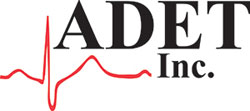ADET is the leading professional training agency in Basic Life Support First Response and Emergency Cardiac Care Training, gaining international recognition with our commitment to excellence!
For over 23 years, ADET has been internationally educating healthcare professionals, executive/corporate, industrial, and community service groups around the world in the skills and techniques of First Aid, Automated Defibrillation and CPR Training. As our programs are registered and accredited through the Heart and Stroke Foundation of Canada and the American Heart Association's Emergency Cardiac Care Program, The Lifesaving Society of Canada, and with our approved Workplace Safety & Insurance Board of Ontario and Manitoba programs, we offer the very best training!
Past President and founder, James E. King ( 1969-2013), created ADET out of the necessity to train our healthcare professionals and educate our neighbours to initiate the Chain of Survival. As a qualified NLS Surf Lifeguard, James realized that survival from traumatic injuries and cardiac arrest depends on a series of critical interventions and, with neglect or delay, survival is unlikely. The Heart and Stroke Foundation of Canada (HSFC) and the American Heart Association (AHA) have used the term 'Chain of Survival' to describe this sequence. As a series of related and connected events, the Chain of Survival defines the roles of bystanders, dispatchers, first responders and emergency service personnel, co-ordinated as a team to help save lives.
At ADET our educational experts are full-time Instructor-Trainers in Emergency Cardiac Care and Basic and Advanced Life Support with areas of expertise ranging from professional Lifeguards in the National Lifeguard Service to certified Trauma Nurses and Paramedics within the Emergency Medical Services. By incorporating this high level of standard and teaching ability into each program, ADET provides a full multi-media presentation, each delivered with the latest knowledge and updated materials available and presented to each participant by currently qualified expert educators.
Our devotion to training offers each participant the highest quality and professionally delivered educational training programs available today. Our teaching philosophy is learner-centered, with emphasis on group interaction and hands-on, practical training methods. This learning style, elementary in its' approach, prepares the participants to think, react, and make decisions during a real emergency situation. This creates the ability for each learner to improvise quickly, by understanding the basics of managing an emergency situation, rather than memorizing typical responses. We strive to maximize learning by creating a low stress environment and by incorporating professional Emergency Care Educators within the field.
We are available 24 hours a day, 7 days a week to conduct your Training program, anywhere at anytime!
Together we help educate, prevent and in essence provide critical emergency care towards any injured persons. By learning or reaffirming your skills as a First Responder, we are....
